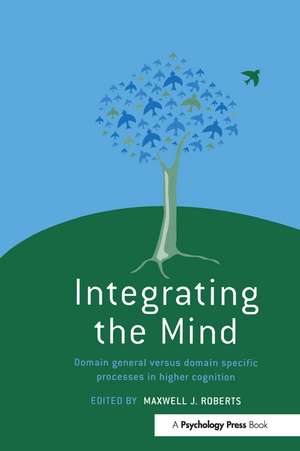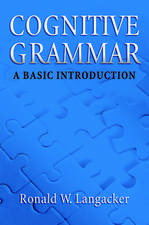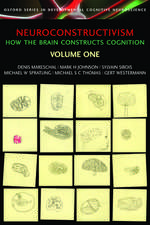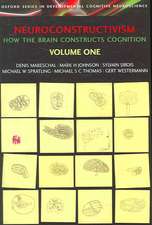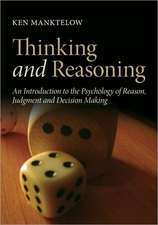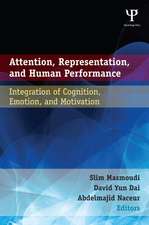Integrating the Mind: Domain General Versus Domain Specific Processes in Higher Cognition
Editat de Maxwell J. Robertsen Limba Engleză Paperback – 16 oct 2013
This book evaluates the evidence and arguments put forward in support of domain specific cognition, at the expense of domain generality. The contributions reflect a range of expertise, and present research into logical reasoning, problem solving, judgement and decision making, cognitive development, and intelligence. The contributors suggest that domain general processes are essential, and that domain specific processes cannot function without them. Rather than continuing to divide the mind’s function into ever more specific units, this book argues that psychologists should look for greater integration and for people’s general cognitive skills to be viewed as an integral part of their lives.
Integrating the Mind will be valuable reading for students and researchers in psychology interested in the fields of cognition, cognitive development, intelligence and skilled behaviour.
Preț: 480.71 lei
Nou
Puncte Express: 721
Preț estimativ în valută:
91.98€ • 96.04$ • 76.13£
91.98€ • 96.04$ • 76.13£
Carte tipărită la comandă
Livrare economică 05-19 aprilie
Preluare comenzi: 021 569.72.76
Specificații
ISBN-13: 9780415655200
ISBN-10: 041565520X
Pagini: 520
Ilustrații: 10 b/w images, 11 tables, 2 halftones and 8 line drawings
Dimensiuni: 156 x 234 x 234 mm
Greutate: 0.72 kg
Ediția:1
Editura: Taylor & Francis
Colecția Psychology Press
Locul publicării:Oxford, United Kingdom
ISBN-10: 041565520X
Pagini: 520
Ilustrații: 10 b/w images, 11 tables, 2 halftones and 8 line drawings
Dimensiuni: 156 x 234 x 234 mm
Greutate: 0.72 kg
Ediția:1
Editura: Taylor & Francis
Colecția Psychology Press
Locul publicării:Oxford, United Kingdom
Cuprins
Roberts, Introduction. Extreme Domain Specificity and Higher Cognition. Roberts, Contextual Facilitation Methodology as a Means of Investigating Domain Specific Cognition. Noveck, Mercier, Van der Henst, To What Extent Do Social Contracts Affect Performance on Wason’s Selection Task? O’Brien, Roazzi, Athias, Carmo Brandão, What Sorts of Reasoning Modules Have Been Provided by Evolution? Some Experiments Conducted among Tukano Speakers in Brazilian Amazônia Concerning Reasoning about Conditional Propositions and about Conditional Probabilities. Over, Content-independent Conditional Inference. Sloman, Lombrozo, Malt, Mild Ontology and Domain-specific Categorization. Newell, Shanks, Perspectives on the ‘Tools’ of Decision-making. McKinnon, Levine, Moscovitch, Domain-general Contributions to Social Reasoning: The Perspective from Cognitive Neuroscience. Stenning, van Lambalgen, Explaining the Domain Generality of Human Cognition. Extreme Domain Specificity and Cognitive Development. Halford, Andrews, Domain General Processes in Higher Cognition: Analogical Reasoning, Schema Induction and Capacity Limitations. Overton, Dick, A Competence-procedural and Developmental Approach to Logical Reasoning. Happaney, Zelazo, Less Specificity in Higher Cognitive Mechanisms: Evidence from Theory of Mind. Moses, Sabbagh, Interactions between Domain-general and Domain-specific Processes in the Development of Children’s Theories of Mind. Mix, Sandhofer, Do We Need a Number Sense? Extreme Domain Specificity versus Domain General Intelligence. Roberts, Do Problem Solvers Need to be Intelligent? Simonton, Creativity: Specialised Expertise or General Cognitive Processes? Adey, The CASE for a General Factor in Intelligence. Gottfredson, Innovation, Fatal Accidents, and the Evolution of General Intelligence. Brody, Heritability and the Nomological Network of g. Chabris, Cognitive and Neurobiological Mechanisms of the Law of General Intelligence.
Notă biografică
Maxwell J. Roberts is a psychology lecturer at the University of Essex.
Recenzii
Integrating the Mind is a "must have" volume for working researchers and graduate students in a variety of cognitive science disciplines. – Keith Stanovich, University of Toronto
The idea that central cognitive processes may be ‘massively modular’ and that this modularity is underpinned by evolutionary forces, has become increasingly influential in the past 15 years. This collection provides a much needed counterweight, critically re-evaluating the evidence for the modular view, and outlining alternative ‘integrated’ views of central cognitive processes. – Nick Chater, Professor of Cognitive and Decision Sciences, University College London
"Integrating the Mind: Domain Specific Processes in Higher Cognition is a book that challenges both the massive modularity hypothesis and extreme contextualism, perspectives on cognition that emphasize the central importance of domain-specific processes that operate only in narrow contexts." - Michael Hogan, PsycCRITIQUES
The idea that central cognitive processes may be ‘massively modular’ and that this modularity is underpinned by evolutionary forces, has become increasingly influential in the past 15 years. This collection provides a much needed counterweight, critically re-evaluating the evidence for the modular view, and outlining alternative ‘integrated’ views of central cognitive processes. – Nick Chater, Professor of Cognitive and Decision Sciences, University College London
"Integrating the Mind: Domain Specific Processes in Higher Cognition is a book that challenges both the massive modularity hypothesis and extreme contextualism, perspectives on cognition that emphasize the central importance of domain-specific processes that operate only in narrow contexts." - Michael Hogan, PsycCRITIQUES
Descriere
Taking a wide-ranging look at the evidence and arguments put forward in support of domain specific cognition, this book argues that domain general processes are important, and that domain specific processes cannot function without them.
